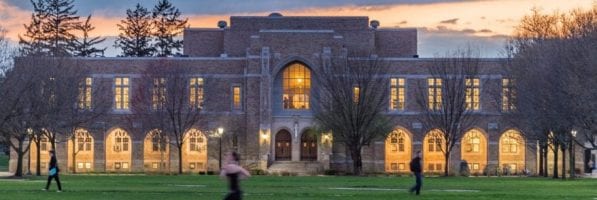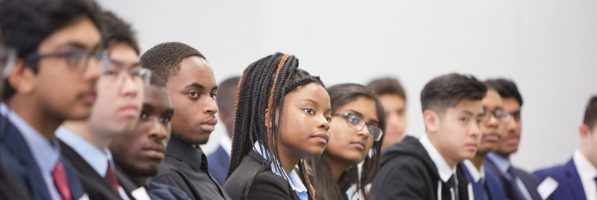How Woman Can Close the Pay Raise Negotiation Gap, and More – Chicago News

Let’s explore some of the most interesting stories that have emerged from Chicago business schools this week.
Are You Willing to Stretch the Truth While Negotiating? – Kellogg Insight
Research trends have found that men are more willing to lower personal ethical standards during negotiations than women when it comes to pay raise negotiation.
However, a new study from Northwestern University Kellogg School of Management‘s Maryam Kouchaki, Assistant Professor of Management and Organizations, finds that there’s a situation that throws a wrench in the works: “when women negotiate on behalf of others.”
Kouchaki and her UC Berkeley co-author Laura Kray write:
“A woman who is negotiating on behalf of someone else will lie at roughly the same rate as her male counterpart. But, if she is negotiating on her own behalf, she is much less likely to deceive. Women in advocacy roles [get] as much done as men.”
You can read more about Kouchaki’s pay raise negotiation research here.
Will EU Migrants Pay Their Fair Share of Taxes? – Chicago Booth News
The Chicago Booth Initiative on Global Markets surveyed its European Economic Experts Panel, which is comprised of “50 economists and top researchers,” about whether recent European migrants are likely to “contribute more in taxes paid than they receive in benefits and public services.”
LSE’s Daniel Sturm writes, “Being younger and typically better educated, their [the migrants’] fiscal contribution tends to be positive as suggested by recent research for the U.K.”
Goethe University Frankfurt’s Jan Pieter Krahnen agrees:
“As [the] employment rate among migrants goes up over time, and much of taxation is indirect anyway, chances are that the statement comes true.”
Director of the European IGM Panel Christian Leuz is less optimistic. “[It is] too early to tell. Labor market outcomes are often worse for [a] long time. Demographics are [a] plus. Much depends on fast integration into [the] labor market.”
You can read more from the panel’s discussion here.
Faculty and Students Team Up with Northern Illinois Food Bank – Quinlan School of Business News
Loyola University Quinlan School of Business’ Urban Social Benefit Incubator teamed up with the Northern Illinois Food Bank to develop a “new system for serving its families” to replace the precarious first-come, first-served process it currently employs.
Quinlan is proposing “an online ordering system that allows for pick-up at strategic locations in the community, such as a grocery store.”
Harry Haney, Associate Director of Quinlan’s Supply and Value Chain Center, who is helping spearhead the initiative, writes:
“It’s important to us to serve nonprofits and social enterprises to help make a difference in the community. Plus, our students are learning the real-world side of business and gaining additional educational exposure.”
You can read more about Loyola’s food bank initiative here.
Notre Dame Mendoza Announces New Master’s, and More – Chicago News

Let’s explore some of the most interesting stories that have emerged from Chicago business schools this week.
Notre Dame’s New One-Year Graduate Business Degree Focuses on Nonprofit Leadership – Mendoza Ideas & News
The Notre Dame University Mendoza College of Business recently launched a new one-year, 36-credit-hour lockstep Master of Nonprofit Administration (MNA) degree intended especially for nonprofit leaders.
Angela Logan, the St. Andre Bessette Director of Nonprofit Professional Development, says, “ Students enter the program with ‘a servant heart,’ and we believe when they graduate, they will also have ‘a business mind.’”
“The Notre Dame MNA affords students who have a commitment to serving the nonprofit sector an opportunity to learn from world-class faculty, who provide a solid business education to prepare them to lead global nonprofit organizations.”
You can find out more about the brand new Notre Dame Masters program here.
How Peer Pressure Can Lead Teens to Underachieve—Even in Schools Where It’s “Cool to Be Smart” – Kellogg Insight
A new study from Northwestern Kellogg School of Management Professor of Managerial Economics and Decision Sciences Georgy Egorov finds that in “smart-to-be-cool” schools, “kids shy away from showing effort in front of their peers” either because they might “face a social stigma for publicly making an effort to excel” but in “cool-to-be-smart” schools, they simply may not want to “reveal their poor grasp of the material.”
Egorov explains, “In a cool-to-be-smart school, students might be more likely to attend an after-school program if it is called “enrichment” rather than “extra help.” But in a smart-to-be-cool school, kids might find it more socially acceptable to seek “extra help” to avoid failing a class than “enrichment,” which suggests trying to excel.”
According to the article, “the reasons why some students fail to take advantage of educational opportunities can differ greatly depending on the school’s overall culture.”
“Administrators should understand their school’s culture when designing policies. For example, making class participation mandatory in a smart-to-be cool school could reduce the stigma of raising one’s hand. But in a cool-to-be-smart school, the same policy could provoke struggling students to disrupt class so they can avoid participating.”
You can read more about Egorov’s study here.
Student Innovator Re-imagining Restaurant Menus – Gies College of Business News
The Gies College of Business News recently profiled student Patryk Swietek, whose augmented reality app Menu3, which “allows customers to view a digital restaurant menu that features a 3D overlay of a dish right on their phone,” was a direct outgrowth of the iVenture Accelerator.”
Swietek writes, “The iVenture Accelerator was on my scope of things to do before I even started here. I’ve known for a little while now that I want to pursue entrepreneurship, but I thought it would take a little while to start on a project worthy of iVenture.”
Menu3 users can rotate photos for a 360-degree view to “help customers better understand portion sizes.” According to the article, Swietek’s first restaurant partner became Champaign’s Maize. They have since added Paris Super Crepes.
iVenture director and co-founder Noah Isserman writes, “Patryk and the Menu3 team exemplify iVenture’s distinctive, community-focused approach to entrepreneurship.”
You can read more from the Patryk profile here.
Notre Dame Startup News, and More – Chicago News

Let’s explore some of the most interesting stories that have emerged from Chicago business schools this week.
Mendoza MBA Student’s Tech Startup Secures $600K Investment – Mendoza Ideas & News
Notre Dame University’s Mendoza College of Business recently profiled current student Cory Bailey ’18, whose startup SecūrSpace is to trucks and shipping containers what Airbnb is to housing.
Bailey explains that SecūrSpace, which recently secured a $600,000 investment, attempts to provide an effective solution to the issue of temporary storage sites outside of normal shipping routes.
It’s not uncommon in the shipping world for trucks to tack on an additional 50-mile trip to a temporary storage site, Bailey explained to Mendoza Ideas & News. “And so these trucks are taking these containers way outside of L.A. and New York and other port cities because they’ve got nowhere to put them,” he said.
Thanks to the aforementioned donation, which mostly came from a Notre Dame alum, Bailey hopes to expand his project in the near future.
You can read more about Bailey and SecūrSpace here.
How a Room’s Lighting Shapes Our Decisions – Kellogg Insights
Northwestern University Kellogg School of Management assistant professor of marketing Ping Dong and Feinberg School of Medicine associate professor of psychiatry and behavioral sciences Dorothy Sit recently published new research that explores how a simple thing like lighting “can change how likely we are to make pleasurable versus practical decisions.”
Dong writes, “Ambient light is a very important experience that is easily manipulated. This shows a new psychological consequence of darkness—consumers more often choose the option that provides immediate pleasure.”
According to the article, there’s a very real possibility that “consumers are also more likely to make pleasurable choices in darker settings—reaching for a candy bar instead of an apple, or buying trendy high heels instead of practical flats—not because they feel physically hidden, but because that feeling of psychological distance frees them to do what they really want.”
You can read more about the duo’s curious research here.
Linking Sustainability, Corporate Governance, and Gender – Quinlan School of Business Blog
Starting next month, Quinlan School of Business management professor Anne Reilly will present ongoing research into “significance of gender diversity in corporate sustainability governance” at several international conferences this year.
Reilly explains that for the second paper, she and her team found that “almost half of the companies studied have at least one person as a designated sustainability leader, and over 50 percent of these leaders are women—compared to the typical 25 percent representation of women executives.”
She elaborates, “Companies are continuing to develop governance roles dedicated to sustainability, and this accountability should strengthen their strategic emphasis on this critical issue. Further, the presence of women leaders as active change agents for sustainability supports progress in gender diversity and inclusion in executive governance.”
Read more about Reilly’s research here.
The Wells Fargo Scandal and a Pattern of Deceit – Chicago News

Let’s explore some of the most interesting stories that have emerged from Chicago business schools this week.
What Makes Deceit Such a Hard Habit to Break? – Kellogg Insights
New research from Northwestern University’s Kellogg School of Management‘s management and organizations department reveals why the Wells Fargo’s and Bernie Madoff’s of the world often find themselves in cycles of deceit and misconduct.
“Because morally questionable behavior is uncomfortable, people don’t want to take responsibility for it,” explains assistant professor Maryam Kouchaki, who, along with assistant professor Nour Kteily and associate professor Adam Waytz, explore what they dub a cycle of “self-dehumanization.”
It’s a process where “people subtly adjust their self-image and begin to view themselves as possessing fewer of the human traits that would curb that bad behavior. They, themselves, aren’t to blame, this line of thinking goes—they’re just not capable of behaving any better.”
You can learn more about the trio’s research here.
Business Students Develop Sponsorship Proposals for Special Olympics – Kellstadt Business Blog
As part of DePaul’s Sports Management faculty director Andy Clark’s winter quarter sports sponsorship marketing course, Kellstadt Graduate School of Business MBA students collaborated with Arena Partners on “attendance-driving ideas and sponsorship strategies” for the Special Olympics’ 50th Anniversary Celebration set to take place in Chicago this coming July.
At one point, the class hosted Kellstadt alum, DePaul Board of Trustees member, and Special Olympics of Illinois Board Chair Karen Atwood MBA ’82, who spoke of the potential impact that Kellstadt MBAs can have on their communities.
“I always think when you can see the impact that your actions, your ideas and your support bring to the larger community, the more it reinforces why the Vincentian values are so important.”
You can find out more about the Special Olympics project here.
Solutions Summit – Quinlan School of Business
The Loyola’s Quinlan School of Business Leadership Hub just announced its first annual Solutions Summit; a networking extravaganza designed especially for vice presidents, directors, and managers; supply chain leaders; and family-owned businesses.
This year’s inaugural event will host Alberto Ruocco, a Senior Executive Partner at cybersecurity leader Gartner; Reynolds VP of Category Management Nancy Bedwell; and Susan Ramonat, CEO of Spiritus, a Blockchain leader. This year’s event will be held on October 9 at the Schreiber Center on 16 E. Pearson St., Chicago.
To register for this year’s Solutions Summit, click here.
The Connection Between Social Mobility and Democracy, and More – Chicago News

Let’s explore some of the most interesting stories that have emerged from Chicago business schools this week.
Is Social Mobility Essential to Democracy? – Kellogg Insights
Northwestern University Kellogg School of Management professor of managerial economics and decisions sciences Georgy Egorov, along with MIT Sloan’s Daron Acemoglu and Chicago Booth’s Konstantin Sonin, recently created a model to understand how voters’ beliefs about social mobility affect their political preferences.
Despite older generations becoming increasingly less optimistic with the potentially positive outcomes of future generations, the researchers find that there’s a decent probability that the children of future generations will rise to a higher economic and social class.
“Having many election cycles means that even with low mobility, the likelihood that a person’s decedents will eventually end up in another class is high. Egorov compares it to two lakes connected by a narrow straight. In the short term, they will not exchange much water. But over the long term, that small exchange will grow and grow until the waters are quite mixed.”
Speaking with Kellogg Insights, Egorov elaborated:
“In a certain sense, expectation of stability begets stability. A thick middle class makes democracy more stable than a thin one. Our research highlights the problems that may follow from a shrinking or thin middle class. Additionally, if the belief in the stability of democracy is undermined, people might well decide it’s not worth defending.”
You can read more about the trio’s research here.
Mendoza Marketing Professor Wins Research Award – Mendoza Ideas & News
The 2018 Louis W. Stern Award has officially been bestowed upon Shankar Ganesan, the John Cardinal O’Hara, C.S.C., professor of business and marketing department chair at the Notre Dame University Mendoza College of Business.
The award recognizes Ganesan, as well as co-authors Steven P. Brown of the University of Houston, Babu John Mariadoss of Washington State and Hillbun (Dixon) Ho of University of Technology Sydney for a 2010 article they published in the Journal of Marketing Research entitled, “Buffering and Amplifying Effects of Relationship Commitment in Business-to-Business Relationships.”
According to the article, “The paper examines the buffering and amplifying effects of relationship commitment on organizational buyers’ intentions to switch suppliers when a relationship is strained by the incumbent’s own misbehavior. “
Check out more from Ganesan’s research here.
The Road Ahead: Takeaways from Economic Outlook 2018 – Chicago Booth Magazine
Chicago Booth Magazine recently dove into the sold-out ‘Economic Outlook 2018’ event last January to “evaluate emerging trends [and] share their insights into the economic outlook for Wall Street and Main Street—ten years after the financial crisis.”
Randall S. Kroszner, the Chicago Booth Norman R. Bobins professor of economics, offered a few optimistic projections:
“I do think [the tax cut] is going to have a positive impact, both in the short run and the long run. I think the broad direction is fairly clear: cutting personal tax rates on a weighted average, of about three percent or so, will have positive impact on demand, because that’s going to allow for higher disposable income in the short run.”
Austan D. Goolsbee, Robert P. Gwinn professor of economics and the former chairman of the Council of Economic Advisers, offered slightly more tempered but optimistic projections as well:
“The danger areas continue to be worries about China, where there has been a big acceleration of debt, and a nagging feeling that we really don’t know what’s in the European financial institutions. That said, the overall growth around the world is looking a little better, for the first time in a little while.”
You can read more about Booth’s ‘Economic Outlook 2018’ overview here.
